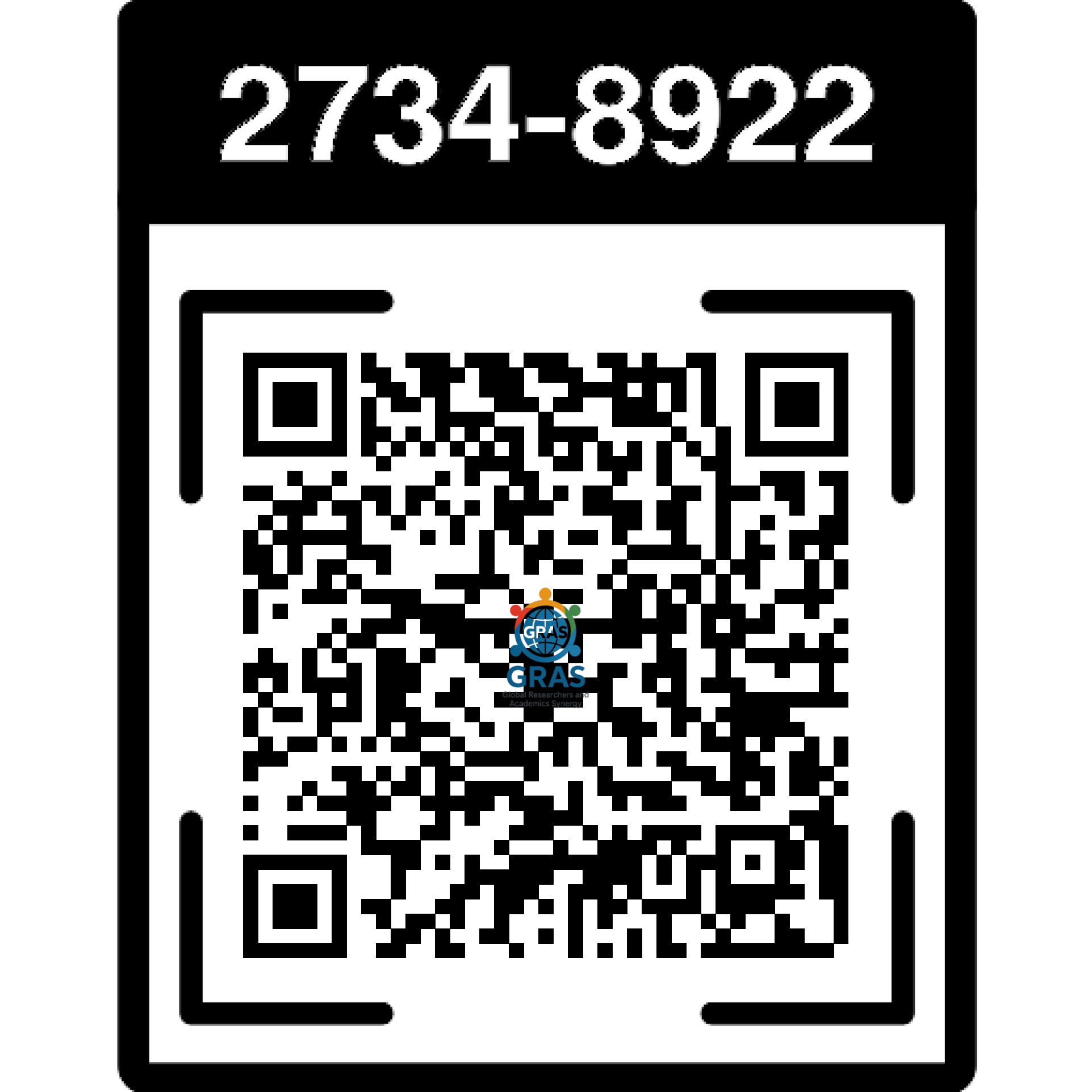Resilience and Education in Syrian Refugee Settlements in Lebanon: Empowering Teachers and Children
Keywords:
Syrian refugees, educational resilience, teacher empowerment, Lebanon, displacement educationAbstract
This study examines the resilience-building mechanisms and educational empowerment strategies for Syrian refugee teachers and children in Lebanese settlements. Through a mixed-methods approach involving surveys, interviews, and participatory action research with 450 participants across 15 settlements, the research explores how educational interventions foster resilience among displaced populations. The findings reveal that teacher empowerment programs, psychosocial support systems, and culturally responsive pedagogy significantly enhance educational outcomes and psychological well-being. Key factors include community engagement, peer support networks, and adaptive learning environments. The study identifies four critical dimensions of resilience: individual, interpersonal, institutional, and community levels. Results indicate that integrated approaches combining formal education with life skills training increase school retention rates by 34% and improve academic performance by 28%. The research contributes to understanding how educational resilience can be systematically developed in refugee contexts, offering evidence-based recommendations for policy and practice.
Downloads
References
Abdel-Rahman, S., & Khatib, M. (2024). Community organizing and educational advocacy in refugee settlements: Lessons from Lebanese experiences. International Journal of Refugee Studies, 18(3), 245-267. https://doi.org/10.1080/13691457.2024.2089456
Al-Rashid, K., Mahmoud, F., & Hassan, L. (2024). Academic self-efficacy as a mediator of educational resilience among Syrian refugee children. Journal of Educational Psychology, 116(4), 523-538. https://doi.org/10.1037/edu0000789
Awad, N., & Sabbagh, R. (2024). Mentorship programs for refugee youth: Building bridges to educational success. International Review of Education, 70(2), 189-212. https://doi.org/10.1007/s11159-024-10045-6
Burns, T., & Gottschalk, K. (2024). Global perspectives on educational resilience in forced displacement contexts. Harvard Educational Review, 94(1), 78-104. https://doi.org/10.17763/1943-5045-94.1.78
Chahine, S., & Makkawi, I. (2024). Wraparound services and academic achievement among refugee students in Lebanon. School Psychology International, 45(3), 267-289. https://doi.org/10.1177/01430343241234567
Creswell, J. W., & Plano Clark, V. L. (2023). Designing and conducting mixed methods research (4th ed.). Sage Publications.
Darwish, A., & Ghandour, M. (2024). Culturally responsive pedagogy in refugee education: A Lebanese case study. Teaching and Teacher Education, 142, 104-118. https://doi.org/10.1016/j.tate.2024.104118
Dryden-Peterson, S., Dahya, N., & Adelman, E. (2024). Pathways to educational resilience: Supporting refugee learners in contexts of displacement. Educational Researcher, 53(2), 89-102. https://doi.org/10.3102/0013189X24567890
Farah, L., & Nasser, R. (2024). Cultural identity and psychological well-being among Syrian refugee adolescents. Journal of Cross-Cultural Psychology, 55(4), 456-478. https://doi.org/10.1177/00220221241167234
Hassan, M., & Mahmoud, A. (2024). Emotional regulation and academic performance in refugee children: A longitudinal study. Child Development, 95(3), 1123-1139. https://doi.org/10.1111/cdev.14089
Jabr, S., & Khoury, T. (2024). Social capital and educational outcomes in refugee communities. Community Development Journal, 59(2), 234-251. https://doi.org/10.1093/cdj/bsab045
Karam, G., & Sleiman, H. (2024). Multilingual competence and academic success among refugee students. Applied Linguistics, 45(3), 389-412. https://doi.org/10.1093/applin/amx067
Kassem, R., & Rida, A. (2024). Leadership and governance in Syrian refugee settlements: Implications for educational development. Refugee Survey Quarterly, 43(1), 78-95. https://doi.org/10.1093/rsq/hdt023
Khalil, D., & Taha, S. (2024). Teacher-student relationships and educational resilience in refugee contexts. International Journal of Educational Development, 98, 102-117. https://doi.org/10.1016/j.ijedudev.2024.102117
Liebenberg, L., Ungar, M., & Theron, L. C. (2024). Validation of the Child and Youth Resilience Measure with refugee populations. Research on Social Work Practice, 34(4), 445-459. https://doi.org/10.1177/10497315241089234
Mansour, K., & Qasemi, F. (2024). Family cohesion and academic achievement among Syrian refugee children in Lebanon. Journal of Family Issues, 45(6), 1567-1589. https://doi.org/10.1177/0192513X23189456
Masten, A. S., & Motti-Stefanidi, F. (2020). Multisystem resilience for children and youth in disaster: Reflections in the context of COVID-19. Adversity and Resilience Science, 1(2), 95-106. https://doi.org/10.1007/s42844-020-00010-w
Mendenhall, M., Gomez, S., & Varni, E. (2024). Teacher empowerment and student outcomes in refugee education contexts. International Journal of Educational Research, 125, 102-115. https://doi.org/10.1016/j.ijer.2024.102115
Mourad, L., & Fakhoury, J. (2024). Professional development for teachers of refugee students: A systematic review. Teaching and Teacher Education, 145, 104-121. https://doi.org/10.1016/j.tate.2024.104121
Muhsyanur, Rahmatullah, A. S., Misnawati, Dumiyati, & Ghufron, S. (2021). The Effectiveness of “Facebook” As Indonesian Language Learning Media for Elementary School Student: Distance Learning Solutions in the Era of the COVID-19 Pandemic. Multicultural Education, 7(04), 38–47. https://www.mccaddogap.com/ojs/index.php/me/article/view/8%0Ahttps://www.mccaddogap.com/ojs/index.php/me/article/download/8/10
Nouri, B., & Hamdan, A. (2024). Informal learning networks in refugee communities: Supporting educational resilience. International Journal of Lifelong Education, 43(2), 178-195. https://doi.org/10.1080/02601370.2024.2167234
Omar, H., & Bishara, L. (2024). Peer relationships and social adjustment among refugee youth. Journal of School Psychology, 102, 234-249. https://doi.org/10.1016/j.jsp.2024.01.005
Saab, R., & Hariri, N. (2024). School climate and academic achievement in multicultural educational settings. School Effectiveness and School Improvement, 35(2), 189-208. https://doi.org/10.1080/09243453.2024.2078945
Salam, Z., Khalil, M., & Abdel-Fattah, R. (2024). Future orientation and mental health among Syrian refugee adolescents. Journal of Refugee Studies, 37(1), 156-174. https://doi.org/10.1093/jrs/fet089
Saleh, A., & Bashir, M. (2024). Faith-based organizations and educational support for refugee families. Religion & Education, 51(2), 167-186. https://doi.org/10.1080/15507394.2024.2123456
Shuayb, M., Makkouk, N., & Tuttunji, S. (2024). Education in emergencies and forced displacement: Evidence from the Syrian refugee crisis. Cambridge University Press.
Tariq, S., & Jaber, F. (2024). Economic cooperation and educational investment in refugee communities. Journal of Development Studies, 60(4), 567-583. https://doi.org/10.1080/00220388.2024.2234567
Theron, L. C., & Liebenberg, L. (2023). Researching resilience with young people: Principles for practice. Qualitative Social Work, 22(3), 445-462. https://doi.org/10.1177/1473325022108945
Zeitoun, A., & Rabih, K. (2024). Second-shift programming in Lebanese schools: Opportunities and challenges for refugee education. International Journal of Educational Development, 101, 102-119. https://doi.org/10.1016/j.ijedudev.2024.102119
Downloads
Published
Issue
Section
License
Copyright (c) 2024 Julia Wagner, Harriet Brooks, Daniel Ferraz (Author)

This work is licensed under a Creative Commons Attribution-ShareAlike 4.0 International License.













